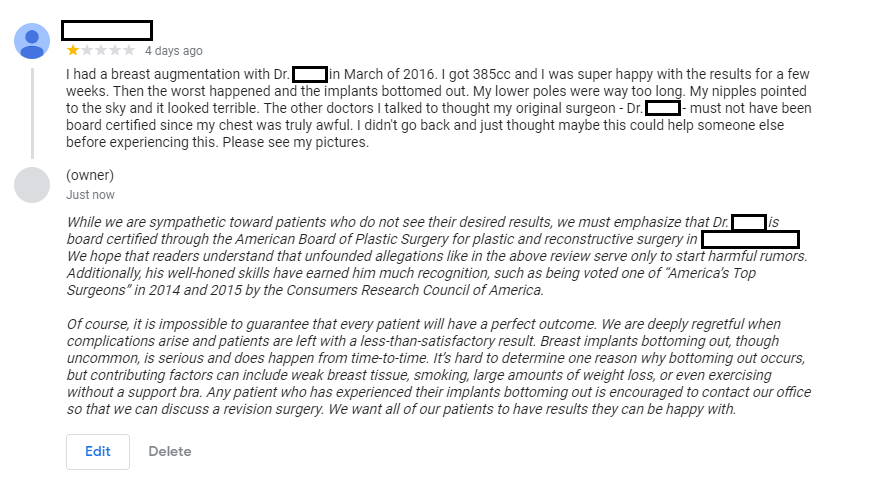So your medical practice has been smeared online. In this situation, you may think you should be the bigger person, and avoid responding. Besides, you have HIPAA compliance to think about. Right?
Wrong. You should be responding to your negative reviews—but not because you feel tempted to tell “your side of the story” (and thus violate HIPAA). Below, we break down the real reasons why.
A measured response shows that you are reasonable
Negative reviews are not the same as an emailed complaint from a patient—they’re public. Chances are, many people are going to read that review when they’re searching for a doctor. Thus, they are an opportunity to publicly show that you are reasonable, you’re not in a debate with the patient, and nor are you ignoring negative feedback.
A response can help take the conversation offline
Negative reviews are also a chance to de-escalate the situation by taking the conversation offline. Share your practice’s direct contact information in the response. As well, reach out to the patient directly (if possible) to learn more about their concerns and try to resolve them.
Your response can be HIPAA-compliant and address the concerns raised by the negative review
When a patient inevitably leaves you a negative review, respond with a HIPAA-compliant explanation of your policies and credentials—not a tit-for-tat argument about why you’re right and they’re wrong. You can also include some background information to educate readers who may come across this review.
Importantly, a response explains to the public how you broadly address problems that a prospective patient might experience. It acknowledges the obvious—that not all patients have a perfect outcome. But the practice will stand by patients to get to a better outcome—if possible.
Here is an example of a review response that does all of these things, which was posted with the help of our online reputation management program, eMerit:

By posting a response that states the practice’s policies and the physician’s credentials without emotion, you show any other searchers who come across the review that your practice handles unhappy patients calmly and with dignity. You project the image that you are a medical professional, and not an irresponsible, unqualified “butcher” that a given reviewer may have painted you to be. In the above example, readers importantly also learn more facts about the complication the reviewer is having, which can help calm the panic that the original review may have invoked in a reader.
Should I also respond to all positive reviews?
Despite the importance of responding to negative reviews, there are potential cons to responding to every online positive review that comes in. Because there are likely to be many more positive reviews, you will have many more chances to accidentally violate HIPAA. A HIPAA-compliant response to a positive review may look like “Thank you!” or a general statement like “Positive reviews like this mean so much to our team.” However, a response that says, “We’re delighted to have satisfied patients like you in our practice” is a technical HIPAA violation because it confirms the reviewer’s status as a patient.
If you feel drawn to express specific appreciation for positive reviews, we recommend thanking the patient one-on-one with an email or a phone call—or in person if you see them in your practice. Plus, these avenues are much more personal.
Are you looking for help managing your online reputation? Learn about our eMerit program for online reputation management here and contact our team to get started!





Looking at this issue from 30,000 feet, one notices that complaints are often not in the doctor’s control. They could be generated by the rude behavior of the receptionist. Or the “hold, please” said 4 times. Or the fact that she would never win “Miss Congeniality” prize. Now the doc is only an employee. He did not hire the receptionist. He cant educate or train the receptionist. He can’t fire the receptionist. But, he, as the doctor, is blamed and these negative reviews, if often, can literally kill his career. So, what to do? I have my suggestions. But, I would consult with Jeff. LOL
Richard Willner
The Center for Peer Review Justice
I am not sure that I agree with responding to negative responses. The response posted above is likely to trigger the patient into even more bitter comments on line. If we were dealing with rationale people that would be one thing. I would contend that anyone that seeks to spout off to social media first, instead of contacting the original doctor, AND goes running around to other doctors who negatively opine about the first doctor, is not a person that one wants to engage with on social media.
The general legal advice for the past 25+ years is not to engage with such people on social media. Have patients leave positive reviews, which will push the negative posts down.
Even though the doctor is board certified, doesn’t mean that he acted in a compassionate manner to the patient. Therefore stating that, could just be like waving a red flag in front of a bull.
In addition from the angry patient’s point of view, the response cited above seems self serving, less than fully compassionate and overly harsh. It is likely to provoke an even more angry response. Only at the very last does the response encourage the patient with a poor result to contact the office. Even stating that implants would bottom out seems like an admission against interest.
I think most physicians called upon to give a response, are not going to give one that is neutral and non inflammatory to patients. In other words most physicians will draft the wrong response because they feel emotionally wounded.
The presentation above is not convincingly going to garner a positive response from the patient or patients.
It is likely going to provoke yet another negative response on the part of the patient.
Worse still since the patient mentioned the doctor by name, this could trigger other patients with negative outcomes to chime in.
The only way to win at this is to get other patients to post positive reviews.
That is the traditional view.
I see nothing in the above response, that changes my opinion that the traditional response on social media is still the best.
I completely agree with Dr Segal on this topic. When we receive a positive review, we send a text or email expressing personal gratitude. Positive reviews speak for themselves, and NOT publicly thanking confirms authenticity. And there is no reason to thank a happy patient for saying, “thanks.”
I also agree we MUST respond to unreasonable, or frequently fraudulent negative reviews. If the negative review is from inappropriate remarks by the doctor, perhaps a bad day, it’s best to pick up the phone and apologize to the patient. If you can let them know you’re human and behaved poorly, it’s an avenue to ask the patient to remove the negative review.
We just received a negative review on Yelp from a patient we treated 10 YEARS AGO. Wtf? And the poster had a good result, but she felt she traveled too far for the perceived minimal improvement. This was an opportunity for us to educate any readers about the procedure in question, and to discuss its limitations, and to refer the reader to our website photo gallery for more information. We mentioned NOTHING about the patient’s experience. It was an educational response for the benefit of readers, and to acknowledge that it’s impossible to make everyone happy, even when we try our best. If the disgruntled poster goes to another rating site, it’s easy to copy and paste the response. And with Medical Justice scouring the internet for all reviews of our practice, it’s easy to keep up with the looney tunes. And as a Medical Justice member, we have the luxury of ensuring that ALL of our online responses are indeed HIPAA compliant. And Medical Justice will post the response for us, so there is no waste of time, energy, or unnecessary worrying. Thank you.
Jeff, what precisely would be the cost of (borderline) violating HIPAA in some way? *One* instance of some arguable violation in the face of some kind of rancid half-truth review?
Jeff, what precisely would be the cost of (borderline) violating HIPAA in some way? *One* instance of some arguable violation in the face of some kind of rancid half-truth review?